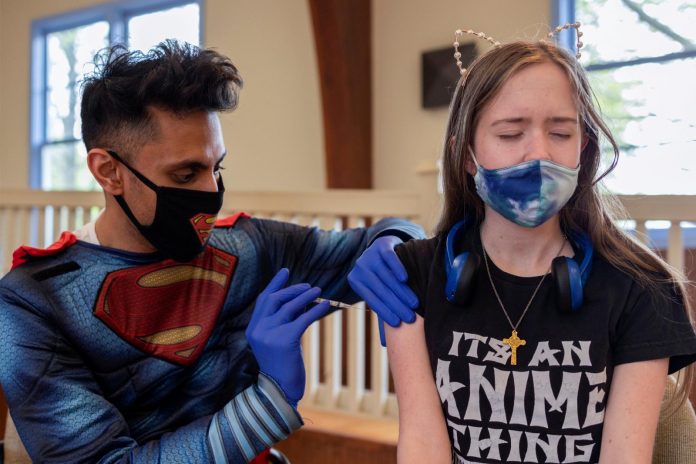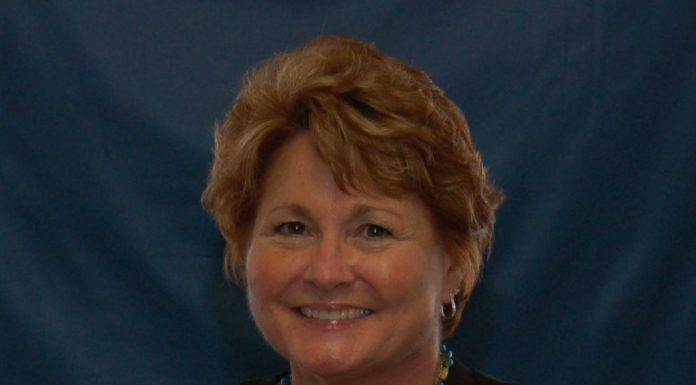
By Katie Scott
PORTLAND, Ore. (CNS) — After a year of painful pandemic milestones, the United States has reached a hopeful statistic. As of May 2, more than 101 million Americans have been fully vaccinated against COVID-19, according to the Centers for Disease Control and Prevention. More than 43% have received at least one dose of the vaccination and the average daily coronavirus case count is down 16%.
Now, vaccines for children are getting attention with questions about when will they be available, if they are necessary to end the pandemic and if Catholic parents should inoculate their children. As these questions are raised, some answers remain clearer than others.
In early April, Pfizer-BioNTech asked the Food and Drug Administration for an emergency use authorization that would allow its COVID-19 vaccine to be administered to 12- to 15-year-olds. The federal agency is expected to issue a decision on this in early May.
Pfizer-BioNTech also is running clinical trials for children 6 months to 11 years old, while Moderna and Johnson & Johnson are in the midst of studying their vaccines’ efficacy and safety in young people.
Dr. Anthony Fauci, the nation’s top infections disease specialist, has predicted that children of all ages will be able to receive a vaccine by the beginning of 2022.
One argument for vaccinating young people is that it is necessary to achieve herd immunity — when a large portion of a community becomes immune to a disease and the spread from person to person thus becomes unlikely.
But a growing number of health experts are not certain herd immunity is possible.
Dr. Paul Cieslak, a senior health adviser for the Oregon Health Authority’s COVID-19 response and a member of St. Rose Parish in Portland, said it’s not clear how long immunity lasts after a vaccination or after an infection or what new strains will emerge.
If it becomes impossible to reach herd immunity because either immunity does not last or the virus mutates, the disease probably will become endemic, Cieslak said. That is, it would continue to circulate in pockets of the world but not cause the illnesses and deaths of the past year. It would be more like the measles or the flu.
Vaccines, however, can play a critical role in moving a community from pandemic to endemic and they at least temporarily protect children from the illness.
Kids are much less likely than adults to be hospitalized with COVID-19, and deaths from the disease among kids are infrequent. But there are concerning trends.
Children now encompass a larger percentage of people getting infected than earlier in the pandemic. A report by the American Academy of Pediatrics shows children accounted for 1 in 5 cases detected nationwide the second week of April. And in Michigan, there has been a record-breaking spike in child hospitalizations.
Cieslak noted that on rare occasions, kids who’ve experienced mild infections develop a sometimes-deadly condition called multi-system inflammatory syndrome in children. Yet children’s risk of dying from the virus remains very low. Since the pandemic began, around 300 U.S. children have died of COVID-19 complications.
Vaccines for children, like those for adults, will come with a small risk.
If the CDC recommends children receive the shots, however, Cieslak likely will suggest parents obtain them to protect their child and others.
“I have a lot of confidence in the vetting that goes on at the FDA and the CDC,” he said. “If a vaccine gets authorized for use and recommended, I’m going to feel pretty comfortable recommending it. I’m going to feel comfortable saying the risk of your child having severe side effects is remote but the chance that they could get the virus and transmit it to other vulnerable people is likely to be greater.”
The Portland doctor also added some nuance to his answer. He believes there are ethical questions that should be explored by Catholic bioethicists. For example, some have made the argument that children must be vaccinated mainly so they will not spread the virus to elderly individuals.
“If it boils down to that argument, some Catholic individuals are going to have a problem with it,” said Cieslak.
At the same time, there is church teaching on solidarity, “and that getting your child vaccinated is helping protect your fellow man,” he said. “I would like to see this all discussed.”



























